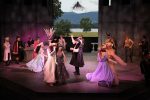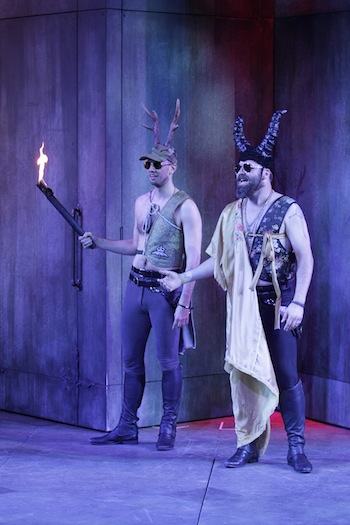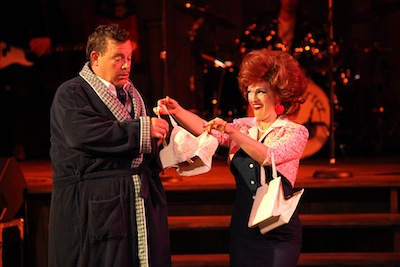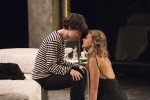Left to right: Kazz Leskard (Iago), Claire Rice (Desdemona) and Courtney Shields (Constance) in Awkward Productions’ Goodnight Desdemona, Good Morning Juliet. (photo by Derek Fu)
Have you ever wished you could change the course of a play, making the plot … well … just a little bit different?
What would have happened if someone had told Othello that Iago was tricking him? What if Romeo and Juliet hadn’t died? Would the plays have been successful as comedies and not tragedies?
These are the questions taken on in Awkward Productions’ Goodnight Desdemona, Good Morning Juliet, part of the first annual Fakespeare Festival.
Written by the award-winning Ann-Marie MacDonald, Goodnight Desdemona is an outlandish and hilarious romp that follows associate professor Constance Ledbelly (Courtney Shields), who is trying to prove a peculiar notion.
Doing her PhD in Shakespearean literature, her thesis revolves around a made-up tome written in code, called the Gustav Manuscript. She believes the work proves that Othello and Romeo and Juliet were originally written by an author who had included a wise fool and that the plays were supposed to be comedies. Shakespeare, she posits, got rid of the fool, turning them into tragedies. If she can only decipher the code, she can find out the identity of the fool and that will lead her to the original playwright.
The theory is laughed at by her colleagues, including a professor for whom she works (and with whom she is in love), who takes advantage of her desire to please him by having her write all his papers. Her work garners him a post at Oxford, which she believes she deserved, and, to top it off, he is running off with another woman, leaving her alone and out of a job.
Disgusted with herself, feeling hurt and betrayed, she begins to trash her office and finds herself transported into the world of Shakespeare, first landing in Othello, when Iago is about to trick Othello into thinking Desdemona has been unfaithful, and next in Romeo and Juliet, as Tybalt is about to kill Mercutio.
Like Alice in Wonderland, Constance is at first bewildered by her surroundings, but, as she is an expert in Shakespeare, she easily comes up with a backstory and picks up the language of the time. She impresses everyone with her knowledge and is accepted as a contemporary, allowing her to proceed on her quest to find the fool that Shakespeare had eliminated and, from there, find the real author.
But, her presence changes the course of events, and the two tragedies become comedies. This is where the play really takes off.
While in Venice, she reveals Iago’s trickery and befriends Desdemona, who, in turn, helps Constance find her own confidence, but also encourages her to revel in killing, which turns Constance’s stomach (being a vegetarian) and causes her to question her usefulness.
“Next to Desdemona, I’m roadkill,” a dejected Constance laments.
In Verona, the turn of events leads to a squabbling marriage between Romeo and Juliet, both of whom fall in love with Constance, leading Romeo to dress in drag, thinking Constance is a lesbian. The thought excites Juliet, who revels in the idea of a girl-on-girl tryst.
The hilarity of these ludicrous set-ups is enhanced by the dazzling wordplay that infuses MacDonald’s script. A “creep” becomes a “base annoysome knave,” for example. Calling herself an academic from Queens, Desdemona believes that Constance is referring to the queen of the Amazons and treats her as one. When Constance appears in Verona, she’s wearing pants and is mistaken for a boy, with uproarious results.
In the end, Constance finds her fool in an unexpected place (alas), and returns home with the confidence to finish her paper, academic derision be damned.
Though the dialogue is lightning-fast and the one-liners are nonstop, Shields carries the weight of the wordy script brilliantly. Jewish community member Zach Wolfman as Mercutio (as well as numerous other characters) calls upon his Shakespeare training to add his own comedic nuance to the production.
It’s not surprising that MacDonald has won several awards for this literary tour de force, including a Governor General’s Award and Canadian Authors Association Award. It is definitely one not to miss.
The Fakespeare Festival features Goodnight Desdemona, as well as Titus Andronicus: The Light and Delightful Musical Comedy of Titus Andronicus. Both plays run at York Theatre, 639 Commercial Dr., until Aug. 28. Tickets are available from tickets.thecultch.com or 604-251-1363.
Baila Lazarus is a freelance writer and media trainer in Vancouver. Her consulting work can be seen at phase2coaching.com.





